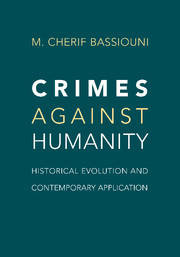Book contents
- Frontmatter
- Contents
- Preface
- Acknowledgments
- Table of Abbreviations
- Introduction
- 1 Legal Nature
- 2 Phenomenological Considerations
- 3 Emergence in Positive International Law
- 4 Post-Charter Developments
- 5 The Principles of Legality in the London Charter and Post-Charter Developments
- 6 Specific Contents
- 7 The Theories and Elements of Criminal Responsibility
- 8 Defenses and Exonerations
- 9 A Survey of National Legislation and Prosecutions for Crimes Against Humanity
- 10 Concluding Assessment: The Need for an International Convention
- Table of Authorities
- Table of Cases
- Index
- References
2 - Phenomenological Considerations
Published online by Cambridge University Press: 05 July 2011
- Frontmatter
- Contents
- Preface
- Acknowledgments
- Table of Abbreviations
- Introduction
- 1 Legal Nature
- 2 Phenomenological Considerations
- 3 Emergence in Positive International Law
- 4 Post-Charter Developments
- 5 The Principles of Legality in the London Charter and Post-Charter Developments
- 6 Specific Contents
- 7 The Theories and Elements of Criminal Responsibility
- 8 Defenses and Exonerations
- 9 A Survey of National Legislation and Prosecutions for Crimes Against Humanity
- 10 Concluding Assessment: The Need for an International Convention
- Table of Authorities
- Table of Cases
- Index
- References
Summary
Power is never the property of an individual, it belongs to a group and remains in existence only so long as the group stays together.
– Hannah Arendt, On Violence 44 (1970)Introduction
Throughout history, abuses of power by tyrannical rulers and ruling-regime elites, which were carried out under their direction mostly by state actors, have occasioned significant human, social, and material harm to their respective national societies as well as to other societies (in the contexts of wars and colonization). Since the end of World War II, forms of collective violent social interactions between ethnic, religious, and political groups have increased significantly, but only limited reliable data have been gathered to document this phenomenon.
Political, social, and behavioral sciences have developed techniques and methodologies for determining the various causes of these violent manifestations, as well as some measurements to assess their outcomes. They are not sufficiently developed to influence policy-making in connection with the prevention or limitation of violent actions, whether at the domestic or interstate levels. Whether or not the absence of policies at the levels of intergovernmental organizations and national governments to prevent and control violent conflicts is the reason for international law's failure to account for the findings and insights of other disciplines is speculative. More likely, international law, as the product of state decision-making, has simply ignored social and behavioral sciences to be less encumbered by scientific findings that may impede state action based on state interests.
- Type
- Chapter
- Information
- Crimes against HumanityHistorical Evolution and Contemporary Application, pp. 51 - 85Publisher: Cambridge University PressPrint publication year: 2011



